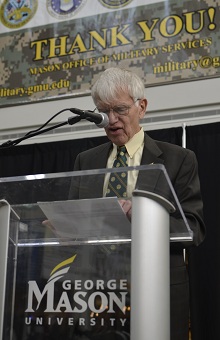Resolution to allow faculty input in presidential search passes Faculty Senate
 President Merten reads a list of names Friday at the Remembrance Day National Roll Call. (Jake McLernon)
President Merten reads a list of names Friday at the Remembrance Day National Roll Call. (Jake McLernon)
President Alan Merten
The resolution that would allow faculty to have input on the final candidates for the presidential search, if approved by the Presidential Search Committee, passed the Faculty Senate Wednesday with a vote of 31-2; and will be given to the committee in the coming days.
“Excellent resolution and [its] good that we passed it,” said Suzanne Slayden a chemistry professor and member of the Faculty Senate Executive Committee which proposed the resolution.
At Wednesday’s meeting the senate added a section from the faculty handbook to the resolution to support their argument: “the search and selection process must include opportunities for the General Faculty to meet with candidates who are finalists for the presidency.”
This means that if the Presidential Search Committee decides to not abide by the resolution from the Faculty Senate, they will violate the faculty handbook.
According to Slayden, the faculty handbook is “binding” but “people violate it all the time.”
The senate also added a timeline to the resolution which says the search committee must report back to the Faculty Senate two weeks prior to the selection of the president to say whether they will comply with the request of the resolution.
Current Mason President Alan Merten announced his retirement last spring. Since June, the presidential search committee has been looking to find a successor to the long-time president. An appointment is expected to be announced in early 2012, according to Chair of the Presidential Search Committee Lovey Hammel.
Questions about confidentiality in the presidential search were raised at a forum with the Chair and Vice-Chair of the search committee on September 14. The Presidential Search Committee has not stated whether the final stages of the search will be made public to the university.
Jan Greenwood, president and chief operating officer of Greenwood Asher and Associates, the search firm handling Mason’s presidential search, said closed searches for university presidents is a growing trend, and many candidates who come from leadership positions are reluctant to apply for a position at another institution if the search is public.
Greenwood also said many public universities have trouble attracting good candidates if the candidate’s name is made public in the search. Greenwood and her partner at the search firm, Betty Turner Asher, published an article on the topic of confidentiality in president searches back in April.
“In general, highly qualified university leaders will participate in confidential search processes, but rarely will they risk involvement in public searches,” Greenwood said in the article.
